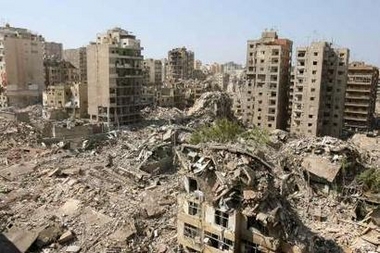 By Roula Khalaf in Beirut and Mark Turner at the United Nations, Published: August 27 2006 18:33 | Last updated: August 27 2006 18:33, The Lebanese government will on Monday press Kofi Annan, UN secretary-general, for a lifting of the Israeli air and sea blockade and appeal for international help to persuade Israel to withdraw from a disputed border area.Mr Annan arrives in Beirut on the first leg of a high-stakes Middle East tour in which he will face a dizzying array of conflicting agendas and entrenched demands.
By Roula Khalaf in Beirut and Mark Turner at the United Nations, Published: August 27 2006 18:33 | Last updated: August 27 2006 18:33, The Lebanese government will on Monday press Kofi Annan, UN secretary-general, for a lifting of the Israeli air and sea blockade and appeal for international help to persuade Israel to withdraw from a disputed border area.Mr Annan arrives in Beirut on the first leg of a high-stakes Middle East tour in which he will face a dizzying array of conflicting agendas and entrenched demands.
Bringing all the parties with interests in Lebanon around a common goal will prove a struggle. His hope of also reinvigorating the broader Arab-Israeli peace process could prove one of the toughest challenges of his chequered career. The trip, which includes Israel, leading Arab states, as well as stops in Syria and Iran, comes ahead of his report to the Security Council on the implementation of the two-week-old UN ceasefire resolution that ended the fighting between Israel and Lebanon
BRUSSELS, Aug. 22 (Xinhua)AP — Lebanon has asked the Netherlands to contribute to the UN peacekeeping mission in the south of the country, by providing vessels to police its coast, Radio Netherlands reported Tuesday. Beirut wants Dutch naval vessels to patrol the coast to combat illegal arms shipments.Lebanese Foreign Minister Fawzi Salloukh requested the assistance from […]
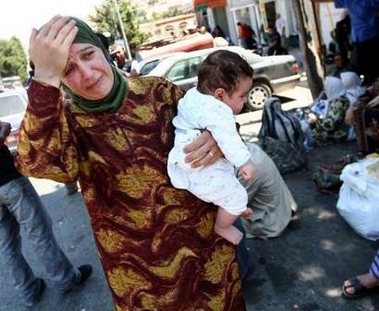 BEIRUT, 21 August (IRIN) AP – The international community should show more commitment to calls by the United Nations to strengthen the international peacekeeping force in Lebanon, said experts in Beirut. "For the ceasefire to hold, the international community needs to show more preparedness and commitment to joining the international peacekeeping force as soon as possible," said Rami Khouri, editor-at-large of The Daily Star newspaper, on Monday. There has already been a breach of the 14 August ceasefire as Israel carried out an attack on the eastern Beqaa Valley on 19 August. The UN condemned the action, saying it was a violation of UN Security Council Resolution (SCR) 1701, which calls for a cessation of hostilities between Israel and the armed wing of Lebanese political party Hezbollah. "The Secretary-General is deeply concerned about a violation by the Israeli side of the cessation of hostilities," a UN spokesman said on 19 August.
BEIRUT, 21 August (IRIN) AP – The international community should show more commitment to calls by the United Nations to strengthen the international peacekeeping force in Lebanon, said experts in Beirut. "For the ceasefire to hold, the international community needs to show more preparedness and commitment to joining the international peacekeeping force as soon as possible," said Rami Khouri, editor-at-large of The Daily Star newspaper, on Monday. There has already been a breach of the 14 August ceasefire as Israel carried out an attack on the eastern Beqaa Valley on 19 August. The UN condemned the action, saying it was a violation of UN Security Council Resolution (SCR) 1701, which calls for a cessation of hostilities between Israel and the armed wing of Lebanese political party Hezbollah. "The Secretary-General is deeply concerned about a violation by the Israeli side of the cessation of hostilities," a UN spokesman said on 19 August.
Israel said it was trying to stop weapons being smuggled from Iran and Syria to Hezbollah in Lebanon. There have also been several airspace violations by Israeli military aircraft, according to the UN. The ceasefire brought fighting between Hezbollah and Israel to an end following a 34-day war, which began after the capture of two Israeli soldiers by Hezbollah on 12 July.
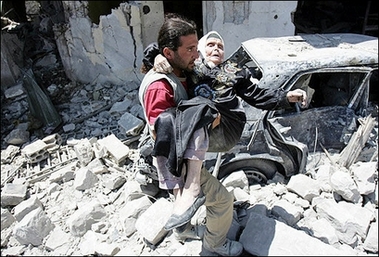 The United Nations AP- on Thursday outlined a "robust" mandate for thousands of international peacekeepers to be deployed in Lebanon and urgently called on member states to pledge troops. UN Deputy Secretary General Mark Malloch Brown said the force would be "robust" but not offensive and set out draft rules of engagement.
The United Nations AP- on Thursday outlined a "robust" mandate for thousands of international peacekeepers to be deployed in Lebanon and urgently called on member states to pledge troops. UN Deputy Secretary General Mark Malloch Brown said the force would be "robust" but not offensive and set out draft rules of engagement.
The peacekeeping force is the keystone in UN Resolution 1701, which outlines the ceasefire and a deployment of Lebanese and international troops to the south of the country to fill the vacuum left by withdrawing Israeli units.
Under the resolution, the UN Interim Force in Lebanon (UNIFIL) is to swell from its current 1 990-strong force. The United Nations hopes an initial deployment of more than 3 000 troops for the strengthened UN force can be in place within two weeks.
Here is a provisional breakdown of countries prepared to contribute troops:
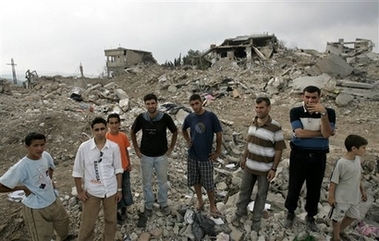
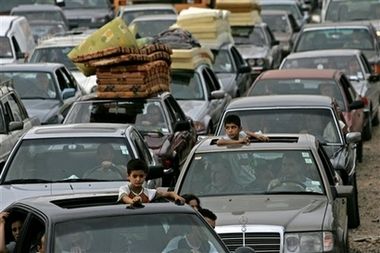 YABOUS BORDER CROSSING, Syria, August 14 (UNHCR)
YABOUS BORDER CROSSING, Syria, August 14 (UNHCR)
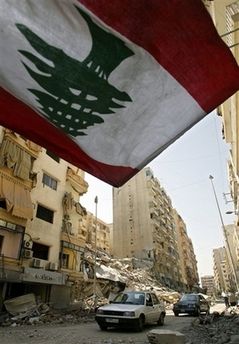 A Lebanese flag flies over cars driving past a collapsed building in a Hezbollah stronghold suburb of Beirut, Lebanon, Saturday, Aug. 12, 2006, that was destroyed following Israeli air strikes. Israeli warplanes struck several targets in north, east and south Lebanon early Saturday, killing at least two people and wounding several others. The attacks came just hours after the U.N. Security Council adopted a resolution calling for an end to the war. (AP Photo/Sergey Ponomarev)
A Lebanese flag flies over cars driving past a collapsed building in a Hezbollah stronghold suburb of Beirut, Lebanon, Saturday, Aug. 12, 2006, that was destroyed following Israeli air strikes. Israeli warplanes struck several targets in north, east and south Lebanon early Saturday, killing at least two people and wounding several others. The attacks came just hours after the U.N. Security Council adopted a resolution calling for an end to the war. (AP Photo/Sergey Ponomarev)
To view more pictures pls click READ MORE, pls click on NEWS ARCHIVE to view also daily news and pictures of the WAR since DAY !
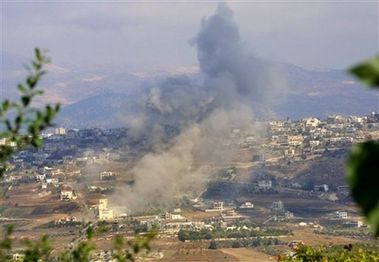 By RAMIT PLUSHNICK-MASTI, aug 13, Associated Press Writer , JERUSALEM – After a stormy debate Sunday, Israel’s Cabinet approved a Mideast cease-fire, agreeing to silence the army’s guns in less than 24 hours. The Israeli military embarked on a last-minute push to devastate Hezbollah, rocketing south Beirut with at least 20 missiles. The 24-0 vote, with one abstention, came a day after the Lebanese government approved the agreement, and Hezbollah leader Hassan Nasrallah gave his grudging consent. The truce was to take effect Monday morning.As the vote took place, Israeli shells slammed into the hard-hit Dahiyeh suburb, a Hezbollah stronghold just south of Beirut, Lebanese television stations said. Al-Arabiya said several buildings were destroyed.
By RAMIT PLUSHNICK-MASTI, aug 13, Associated Press Writer , JERUSALEM – After a stormy debate Sunday, Israel’s Cabinet approved a Mideast cease-fire, agreeing to silence the army’s guns in less than 24 hours. The Israeli military embarked on a last-minute push to devastate Hezbollah, rocketing south Beirut with at least 20 missiles. The 24-0 vote, with one abstention, came a day after the Lebanese government approved the agreement, and Hezbollah leader Hassan Nasrallah gave his grudging consent. The truce was to take effect Monday morning.As the vote took place, Israeli shells slammed into the hard-hit Dahiyeh suburb, a Hezbollah stronghold just south of Beirut, Lebanese television stations said. Al-Arabiya said several buildings were destroyed.
Earlier Sunday, Israeli warplanes fired missiles into gasoline stations in the southern port city of Tyre, killing at least ten people in those and other attacks. Fierce ground fighting involving 30,000 Israeli troops continued in the south, where Israel lost 24 soldiers Saturday, including five on a helicopter shot out of the air by the Lebanese resistence. In Jerusalem, a heated debate erupted during the Cabinet session, with minister Ofir Pines-Paz criticizing the government’s decision to order an expanded ground offensive in the days before the cease-fire is to take effect.
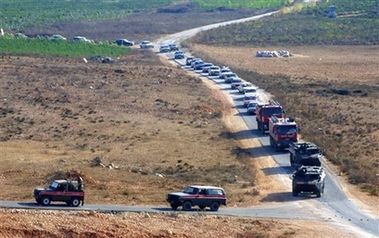 Anthony Shadid, Washington Post Foreign Service, Sunday, August 13, 2006; Page A01, HASBAYA, Lebanon, Aug. 12, Israeli troops entered Marjayoun at 3:30 a.m. Thursday. They had first seized Burj al-Molouk. Next was Qleia. The last, along a road stretching from the border, was the capital of the province, a faded, once-prosperous town that unfurls up a hill overlooking a valley carpeted in olive trees and the imposing, wizened peaks of Mount Hermon, known here as Jebel al-Sheikh."They came with the tanks, of course," said Fouad Hamra, the town’s mayor.
Anthony Shadid, Washington Post Foreign Service, Sunday, August 13, 2006; Page A01, HASBAYA, Lebanon, Aug. 12, Israeli troops entered Marjayoun at 3:30 a.m. Thursday. They had first seized Burj al-Molouk. Next was Qleia. The last, along a road stretching from the border, was the capital of the province, a faded, once-prosperous town that unfurls up a hill overlooking a valley carpeted in olive trees and the imposing, wizened peaks of Mount Hermon, known here as Jebel al-Sheikh."They came with the tanks, of course," said Fouad Hamra, the town’s mayor.
Residents said the 400 or so families in the town of Marjayoun stayed indoors, some too fearful to look out their windows to the street. Even a loud voice might draw notice, they said. The Israeli presence was ghostly — some heard voices, a few saw the soldiers themselves, most knew of their presence by word of mouth, news broadcasts and the sound of fighting that went on outside their doors."People didn’t dare leave their homes," said Hikmat Farha, a 53-year-old resident now staying in a Beirut suburb.Nearly everyone has now departed the Christian town, where houses of cream stone and red-tiled roofs sit tucked in a southern corner of Lebanon, perched unfortunately along the Israeli border. Some left in the early days of the month-long war, when Israeli forces laid siege to Khiam, a Shiite Muslim town across the valley, where fighting still raged Saturday. Most, like Hamra, left Friday in a harrowing convoy of hundreds of cars that plied a moonlit road and was attacked by Israeli aircraft. Six people were killed and more than 30 wounded
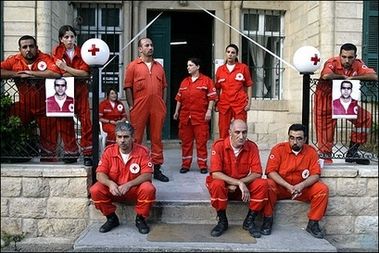 Michael Winfrey BEIRUT, Aug 13 (Reuters) – Relief agencies sent convoys towards southern Lebanon on Sunday, hoping a planned truce between Israel and Hizbollah guerrillas would mean rapid improvement in the humanitarian crisis there. Frustrated by heavy fighting and a ban on movement imposed by Israel’s army, aid workers say they have been unable to bring food, water and medicine to an estimated 100,000 people trapped south of Lebanon’s Litani River. But they said they could reach the area on short notice if a truce resulting from last week’s U.N. Security Council resolution to end the war takes place on Monday as planned.
Michael Winfrey BEIRUT, Aug 13 (Reuters) – Relief agencies sent convoys towards southern Lebanon on Sunday, hoping a planned truce between Israel and Hizbollah guerrillas would mean rapid improvement in the humanitarian crisis there. Frustrated by heavy fighting and a ban on movement imposed by Israel’s army, aid workers say they have been unable to bring food, water and medicine to an estimated 100,000 people trapped south of Lebanon’s Litani River. But they said they could reach the area on short notice if a truce resulting from last week’s U.N. Security Council resolution to end the war takes place on Monday as planned.



